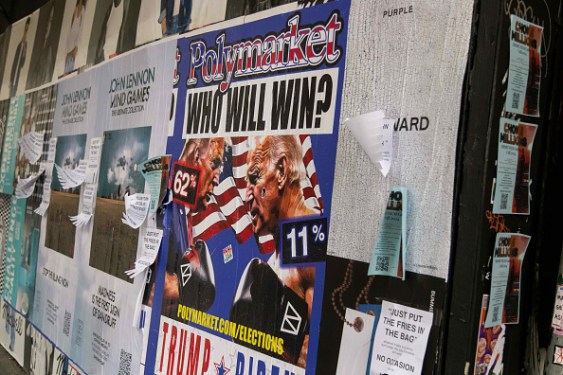In a recent podcast interview, Kalshi CEO Tarek Mansour revealed that his employees had asked social media influencers to promote memes about the FBI’s raid on the home of his archrival, Polymarket’s CEO Shayne Coplan. This move was an attempt to capitalize on Polymarket’s misfortunes and create a negative public perception against their rival.
The Rivalry Between Kalshi and Polymarket
Kalshi and Polymarket are two companies that offer competing event-betting markets, a new kind of betting industry where people wager about the outcomes of events ranging from elections to popular culture. The FBI raided Polymarket’s CEO Shayne Coplan last month, which sparked an intense rivalry between the two companies.
Mansour Admits to Kalshi’s Social Media Campaign
During the podcast interview with Nichole Wischoff on "First Money In," Mansour acknowledged that some of his employees got "pretty heated" and asked social media influencers to post memes about Polymarket’s raid. However, he emphasized that these influencers were not paid for their services.
"Some of our team got pretty heated. They didn’t pay anyone; they just asked some of our longstanding affiliates to post some of the memes," Mansour said in the interview.
The Controversy Surrounding Kalshi’s Social Media Campaign
Pirate Wires, a media outlet founded by Mike Solana, reported that Kalshi employees were paying influencers to post content suggesting that Polymarket and its CEO Shayne Coplan were engaging in illegal activities. However, Pirate Wires also acknowledged its own apparent conflicts of interest with this report.
Solana is a chief marketing officer for Founders Fund, one of Polymarket’s key investors, and Polymarket is an advertiser for Pirate Wires. This raises questions about the credibility and impartiality of Pirate Wires’ reporting on the issue.
The Deleted Podcast Segment
The podcast segment discussing Kalshi’s response to the raid and the rivalry with Polymarket was deleted shortly after it initially aired. However, TechCrunch obtained and listened to the deleted portion of the interview.
During the deleted segment, Mansour accused Polymarket of engaging in similar social media tactics against Kalshi. "Both companies have been doing this," he said, adding that his team believed Polymarket was behind some social media posts suggesting that "we also got raided by the FBI. That did not happen," he said. "We did not get raided by the FBI."
The Allegations Against Polymarket
Polymarket alleged that the reasons for the raid had to do with political motivations surrounding wagers on the U.S. presidential election, although both markets were making bets on its outcome.
According to Bloomberg, the Department of Justice is investigating Polymarket for allegedly allowing U.S. users to engage in restricted trades. Following a 2022 settlement with the Commodity and Exchange Commission, Polymarket is barred from allowing U.S. traders to place bets on its platform, Bloomberg also reported.
Kalshi’s Response
While Kalshi didn’t fire the involved employees, Mansour said that they "understand that it was a mistake, and they shouldn’t do this again." Mansour also acknowledged that his company let the social media wars "go too far" by members of his team.
"I don’t think there’s a point going tit for tat," he said in the interview.
The Consequences of Social Media Wars
The social media campaigns launched by Kalshi and Polymarket have sparked controversy and raised questions about the ethics of using influencers to create negative publicity against rival companies. The incident highlights the importance of maintaining transparency and honesty in business practices, especially when it comes to online marketing and advertising.
The Impact on the Event-Betting Industry
The rivalry between Kalshi and Polymarket has significant implications for the event-betting industry as a whole. The increased competition and aggressive marketing tactics may lead to further consolidation in the market, with smaller players struggling to keep up.
However, it also presents opportunities for innovation and disruption in the industry. With the rise of online betting and gaming, companies like Kalshi and Polymarket are pushing the boundaries of what is possible in event-betting markets.
Conclusion
The social media wars between Kalshi and Polymarket serve as a reminder of the importance of maintaining integrity and transparency in business practices. As the event-betting industry continues to grow and evolve, companies must prioritize fair play and respect for their competitors.
By acknowledging the mistakes made by his employees and taking steps to prevent similar incidents in the future, Mansour has demonstrated a commitment to upholding ethical standards in Kalshi’s online marketing efforts.



